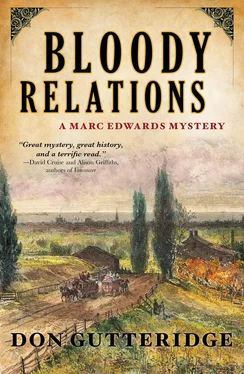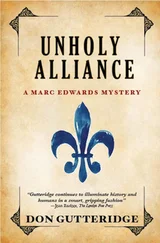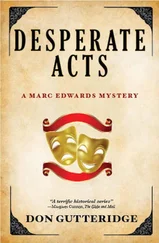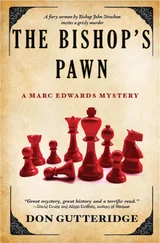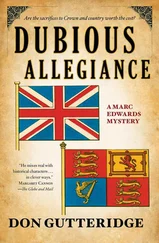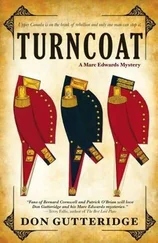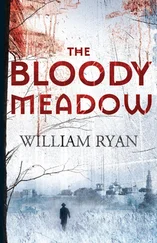Don Gutteridge - Bloody Relations
Здесь есть возможность читать онлайн «Don Gutteridge - Bloody Relations» весь текст электронной книги совершенно бесплатно (целиком полную версию без сокращений). В некоторых случаях можно слушать аудио, скачать через торрент в формате fb2 и присутствует краткое содержание. Год выпуска: 0101, Издательство: Touchstone, Жанр: Исторический детектив, на английском языке. Описание произведения, (предисловие) а так же отзывы посетителей доступны на портале библиотеки ЛибКат.
- Название:Bloody Relations
- Автор:
- Издательство:Touchstone
- Жанр:
- Год:0101
- ISBN:нет данных
- Рейтинг книги:3 / 5. Голосов: 1
-
Избранное:Добавить в избранное
- Отзывы:
-
Ваша оценка:
- 60
- 1
- 2
- 3
- 4
- 5
Bloody Relations: краткое содержание, описание и аннотация
Предлагаем к чтению аннотацию, описание, краткое содержание или предисловие (зависит от того, что написал сам автор книги «Bloody Relations»). Если вы не нашли необходимую информацию о книге — напишите в комментариях, мы постараемся отыскать её.
Bloody Relations — читать онлайн бесплатно полную книгу (весь текст) целиком
Ниже представлен текст книги, разбитый по страницам. Система сохранения места последней прочитанной страницы, позволяет с удобством читать онлайн бесплатно книгу «Bloody Relations», без необходимости каждый раз заново искать на чём Вы остановились. Поставьте закладку, и сможете в любой момент перейти на страницу, на которой закончили чтение.
Интервал:
Закладка:
“And good for you,” Owen said. “I just hope you’ve got enough energy left to put an old soldier through his paces.”
“For you, always,” Beth said. She turned to Marc. “But first, I think I’m ready for something fizzy and one of those tidbits.”
Left alone again, Marc glanced toward Lord Durham, standing a few steps to his right and, for once, unattended. He approached and was gratified when the earl remembered him from the receiving line. “Marc Edwards,” he greeted him warmly, as the two men shook hands once again.
They exchanged niceties about Spadina House and the weather only briefly before Lord Durham asked for his views on the current political situation in the Canadas. Marc was hesitant at first, but then found himself reciting the familiar litany of farmers’ grievances and frustration with a deadlocked legislature.
“How can we break that impasse?” asked Durham, perhaps testing the younger man.
“We need an elected assembly with real powers,” Marc said boldly. “And ministers who are responsible to it.”
“A controversial but interesting notion,” was the reply.
Just then Lady Durham arrived and, with apologies, steered her husband towards a nearby group of hovering admirers.
Marc found Beth and happily partnered her for the rest of the evening’s dancing. From time to time, they glimpsed the whist players, who kept their game going despite the distractions of music and food. Handford Ellis played with concentration and did not return to the dance floor. Shortly after eleven o’clock, Beth admitted to fatigue and Marc agreed they should take their leave. They said their good-byes to their hosts, Lady Durham gracious and grateful to Beth, Lord Durham smiling broadly at Marc.
“I could reach up and touch that big star,” Beth said sleepily, her head resting on her husband’s left shoulder as they sat close together in the gig on the way home, “if I had an ounce of energy in me.”
“You left it all on the dance floor back there.”
“You did pretty well yourself, for a man with a war wound.”
They moved along in companionable silence, with only the rhythmic clack of the gig’s wheels and muffled clop of the horse’s hooves to interrupt their thoughts.
“You did a wonderful and generous thing tonight,” Marc said, as they wheeled off Spadina Avenue, crossed Lot Street, and entered the city proper.
“You mean I survived the good intentions of the Family Compact?”
“You made young Ellice’s evening. His shyness was painful to watch.”
“I hope he enjoyed his whist.”
“I’m sure he did. In addition to the obvious benefit, I think you may have helped to put Lord Durham’s mind at ease in that regard. He’s got enough worries here without that particular one adding to the list.”
“Handford must’ve had a lonesome upbringing.”
“I can imagine it-only son of a famous and ambitious father, wealthy from his business interests and highly influential with the Whig government. Do you know, they call Ellice Senior the Bear!”
They swung east onto King Street.
“By the way, there’s something important I must tell you,” Beth said, suddenly solemn.
Marc almost dropped the reins. Was this the news he had been hoping for? The marriage of Beth and Jesse Smallman had produced no children, but still. .
“I think I may be starting to fit in with that crowd up there,” she said, with just a hint of amusement.
Marc swallowed his disappointment and asked, “Why is that?”
“Mr. Wakefield pinched my bottom.”
THREE
Cobb reached the corner of Lot and Yonge for the umpteenth time, and nodded at the nearly full moon that had risen far enough into the eastern arc of the sky to pour a mellow glow along the ungravelled road, making the shadowed ruts appear deeper and not a little sinister, and the silhouettes of the buildings and houses loom ominously at the edge of his vision. Across the road, Montgomery’s Tavern was unlit and eerily silent.
A tiny, involuntary shudder rippled up his body as Cobb approached the intersection of Bay and Lot (the name of the latter, it was suggested in the right circles, to be changed to Queen Street in honour of the new sovereign). Bay Street ended here; everything north of it as far as College Street was part of the extensive university grounds-College Park, as it was locally dubbed. However, the few hundred acres of its expanse that lay just to the north and west of the Bay-Lot intersection, not a quarter mile from the majestic Osgoode Hall, had a less savoury designation: Irishtown.
Technically it was part of Wilkie’s patrol, but unless called upon in some dire and self-evident emergency, no constable ventured into its grubby interior and, even then, not alone. The area was essentially a squatters’ haven. Its three dozen dwellings were ramshackle affairs at best: half-log shanties, clapboard hovels, temporary lean-tos confected out of the handiest scraps and flotsam of the town they appended, as welcome as a carbuncle on a buttock. Here the unemployed, the underemployed, and the unemployable permanently congregated and became indistinguishable from the petty criminals, absconding spouses, and all-’round deadbeats who found temporary refuge among the maze of crooked lanes and labyrinthine walkways no respectable citizen could, or would wish to, negotiate. The stench of open sewers rose up around Irishtown as sturdy and dissuasive as a rampart.
It had been christened Irishtown some years back when a few destitute families from Connaught had camped there, but its current denizens were as polyglot as their legitimate counterparts in the town and, if the truth be known, little different in the range and persistence of their vices. However, lest a decent citizen wax sentimental about this truism, Cobb would be the first to point out that Irishtown had been the likely source of the biennial epidemics of cholera in the early thirties. It was an indisputable fact that anyone entering the area, day or night, without a plausible reason for doing so was almost certain to be persuaded to depart posthaste, and usually physically assisted in the act.
Among the acceptable excuses for nocturnal entry-and one earnestly condemned each Sunday from multiple pulpits-was a visit to either of two well-maintained and annually repainted houses. These were, in the fiery words of Archdeacon Strachan, “houses of infamy” or, in the common parlance preferred by Cobb and his colleagues, “hooer-houses.” There were, of course, a number of less settled and less ostentatious bawdy shops or cathouses throughout the town. But while these came and went, flourished and withered, the unholy pair in Irishtown had stood stalwart against verbal assault and police raid. (The latter threat had been carried out only once, a few months after the constabulary was formed in 1835. When the found-ins were discovered to be principally members of the same class who had established the new police force to eradicate such crime, a stalemate was quickly declared and it was hands off ever since.)
But why would any respectable gentleman, born or self-proclaimed, risk the night dangers of Irishtown for a brief and costly romp with some mangy female of indeterminate age and pedigree, when other, less hazardous alternatives were often available? It was a question Cobb had asked himself once or twice but, finding no answer, he dismissed the puzzlement as inexplicable and got on with his life.
What he did discover, from Wilkie and at first hand on his occasional patrols up here, was that the hazards of reaching and returning from these dens of fleshly delight were minuscule in comparison with those inside them. If a gentleman of obvious prosperity or a sailor with a bulging purse lingered on the edge of Irishtown any time after dark, he would soon be corralled by what Wilkie termed a tracker or scout, usually a scruffy youth, who would lead the prospective client through the shadowy maze of lanes to the house of his choice: Madame Renée’s or Madame Charlotte’s (neither woman was French, nor madame ). A discreet knock, whispered negotiations, and the contract was sealed. Much later, sated and lighter in the wallet, the client would be guided back to Lot Street, where a tracker of obsequious discretion might well be tipped a shilling for his pains. What actually went on in these French parlours, beyond the mundane act itself, Cobb did not know and was unable, despite some effort, to imagine.
Читать дальшеИнтервал:
Закладка:
Похожие книги на «Bloody Relations»
Представляем Вашему вниманию похожие книги на «Bloody Relations» списком для выбора. Мы отобрали схожую по названию и смыслу литературу в надежде предоставить читателям больше вариантов отыскать новые, интересные, ещё непрочитанные произведения.
Обсуждение, отзывы о книге «Bloody Relations» и просто собственные мнения читателей. Оставьте ваши комментарии, напишите, что Вы думаете о произведении, его смысле или главных героях. Укажите что конкретно понравилось, а что нет, и почему Вы так считаете.
